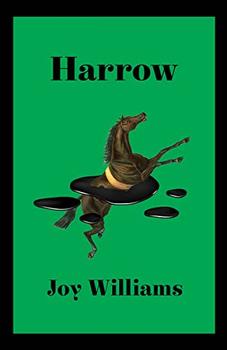Summary | Excerpt | Reviews | Beyond the book | Read-Alikes | Genres & Themes | Author Bio

A novel
by Joy WilliamsIn her first novel since The Quick and the Dead (a finalist for the Pulitzer Prize), the legendary writer takes us into an uncertain landscape after an environmental apocalypse, a world in which only the man-made has value, but some still wish to salvage the authentic.
Khristen is a teenager who, her mother believes, was marked by greatness as a baby when she died for a moment and then came back to life. After Khristen's failing boarding school for gifted teens closes its doors, and she finds that her mother has disappeared, she ranges across the dead landscape and washes up at a "resort" on the shores of a mysterious, putrid lake the elderly residents there call "Big Girl."
In a rotting honeycomb of rooms, these old ones plot actions to punish corporations and people they consider culpable in the destruction of the final scraps of nature's beauty. What will Khristen and Jeffrey, the precocious ten-year-old boy she meets there, learn from this "gabby seditious lot, in the worst of health but with kamikaze hearts, an army of the aged and ill, determined to refresh, through crackpot violence, a plundered earth"?
Rivetingly strange and beautiful, and delivered with Williams's searing, deadpan wit, Harrow is their intertwined tale of paradise lost and of their reasons—against all reasonableness—to try and recover something of it.
Harrow is a difficult book in many ways. There's nothing easy about reading it, which I happen to like. The book replicates the post-apocalyptic haze it depicts: events are vague and fleeting, people come and go with little to introduce or see them off, and even the main character isn't always central. And yet, I'm utterly haunted by it, likely because there's so much left unknown. Furthermore, as someone who copes with difficulty by using dark humor, I appreciate how nothing is sacred in the author's jokes. A few times, I cackled so hard I dropped the book...continued
Full Review
(831 words)
This review is available to non-members for a limited time. For full access,
become a member today.
(Reviewed by Erin Lyndal Martin).
 In Joy Williams' Harrow, two characters discuss Franz Kafka's "The Hunter Gracchus," a short story written in 1917 and published posthumously in 1931, along with a document that was marked as a fragment, which appears to be an addendum to the story.
In Joy Williams' Harrow, two characters discuss Franz Kafka's "The Hunter Gracchus," a short story written in 1917 and published posthumously in 1931, along with a document that was marked as a fragment, which appears to be an addendum to the story.
Franz Kafka was born into a well-to-do Jewish family on July 3, 1883 in Prague. He had considerable conflict with his father growing up and throughout his life and wrote extensively about his father's "intellectual domination," temper, and habit of crushing all enthusiasm out of his son. Kafka went on to study law at the University of Prague and worked as a law clerk for a year. Whatever he did, life with his father was simply too oppressive.
Kafka wanted to move to Berlin, where his fianc...
This "beyond the book" feature is available to non-members for a limited time. Join today for full access.

If you liked Harrow, try these:

by C Pam Zhang
Published 2024
The award-winning author of How Much of These Hills Is Gold returns with a rapturous and revelatory novel about a young chef whose discovery of pleasure alters her life and, indirectly, the world

by Rachel Kushner
Published 2024
From Rachel Kushner, a Booker Prize finalist, two-time National Book Award finalist, and "one of the most gifted authors of her generation" (The New York Times Book Review), comes a new novel about a seductive and cunning American woman who infiltrates an anarchist collective in France—a propulsive page-turner of glittering insights and dark ...
These are not books, lumps of lifeless paper, but minds alive on the shelves
Click Here to find out who said this, as well as discovering other famous literary quotes!